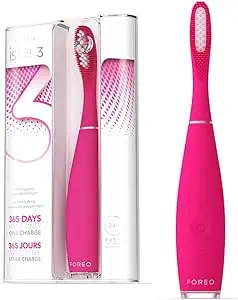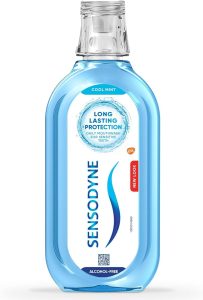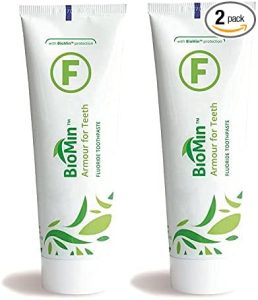Are your teeth sensitive to sugar? If you experience sharp pain or discomfort in your teeth when you eat sweets or drink sugary drinks like fizzy pop then they probably are.
So, why do sugary foods and drinks cause sensitive teeth? This article will discuss why sugar can cause teeth sensitivity and answer the following questions:
- Why are my teeth sensitive to sugar?
- How can you prevent teeth from being sensitive to sugar?
- What are the risks of not taking preventative action?
- Are there any treatments for teeth sensitive to sugar?
The most obvious action that you can take is to avoid sugary food and drinks completely. However, for some (especially those with a sweet tooth) that can be virtually impossible!
Fortunately, you can address this issue without having to completely give up sweet treats.
The following table summarises the products available to help with teeth sensitive to sugar:
Products for Sensitive Teeth | ||
FOREO ISSA Range  |
| |
Sensodyne Cool Mint Sensitive Care Mouthwash  |
| |
BioMin F Toothpaste  |
| |
Sensodyne Sensitive Repair & Protect Toothpaste  |
| |
First, let’s discuss why your teeth may be sensitive to sugar.
What causes tooth sensitivity?

There are a variety of reasons why your teeth may be sensitive to sugar. The main reason stems from having worn or damaged tooth enamel from brushing too hard, chips or cracks in your teeth, tooth decay, or erosion from consuming too many acidic foods and drinks.
Having compromised enamel means that sugar and other acidic foods can more easily access the sensitive dentin layer underneath, causing irritation.
Teeth sensitivity is often associated with eating and drinking hot or cold food or drinks, as well as exposure to cold air, but rarely sugar. Yet sugar is another irritant that can trigger sensitivity because it is acidic. Once the outer layer of your teeth is compromised, acidic foods can reach the sensitive dentin layer below and cause irritation, pain and sensitivity.
The following video summarises why sugar can damage teeth and cause sensitivity:
Another possibility is that you have dental cavities caused by tooth decay, which further exposes the sensitive layer of your teeth to sugar when you eat or drink it. Tooth decay can be caused by eating too much sugar, which then leads to sensitive teeth when you eat more sugar.
If you aren’t suffering from tooth decay, gum disease is another possibility. Gum disease causes the gums to pull away from the teeth and leaves the roots exposed, which when exposed to sugar can feel irritated, inflamed, and sensitive. Other reasons you may have sensitive teeth include:
If you are experiencing severe pain in your teeth that lasts for a prolonged amount of time, it is best to seek advice from your dentist. Intense teeth sensitivity and pain may be a sign that you have underlying dental issues that need addressing by a dental professional.
How can you prevent tooth sensitivity to sugar?
The most obvious prevention of teeth sensitivity to sugar is to avoid eating and drinking sugar. Seems like a simple solution, but really it’s an unrealistic goal, especially as sugar is everywhere and in so many types of foods and drinks.
So, it is more realistic to reduce your sugar intake rather than to avoid it altogether and that way you can still enjoy some of your favourite treats.

Most adults and children in the UK consume too much ‘free sugar’. This includes sugars added to obviously sugary food and drinks like biscuits, cakes, sweets and fizzy pop. But, it also includes less obvious choices like flavoured yoghurts, breakfast cereals and fruit juice.
There are also free sugars in more natural food and drink items such as honey, natural fruit juices, and even vegetable juices.
Being more aware of which foods have ‘free sugars’ in them can help you make better choices. Some tips for reducing sugar in your diet include:
- Choose sugar-free drinks like water, low-fat milk, or diet options
- Reduce the amount of sugar you add to hot drinks and breakfast cereal slowly until you can cut it out altogether
- Try spreading avocado, banana or low-fat cream cheese on your bread rather than jam or honey
- Choose unsweetened wholegrain breakfast cereals over sugary options
- Add fruit for sweetness rather than sugar or honey
- Try a food tracker app to track your sugar intake
Always check food labels to see the sugar content, and for further tips to reduce sugar in your diet, check the NHS Change4Life website.
How much sugar can you have?
According to the NHS, the average adult should have a maximum of 30g of sugar per day. Children aged 7 – 10 should have no more than 24g per day and children aged 4-6 no more than 19g per day.
They also recommend that the number of free sugars eaten shouldn’t make up more than 5% of your daily calories.
When eaten in excess, free sugars can lead to tooth decay and weight gain, which can lead to much more serious health issues. These health issues can include type 2 diabetes, heart disease and some cancers.
How can I stop my teeth from being sensitive to sugar?
Besides reducing your sugar intake, there are other things that you can do to help reduce teeth sensitivity after eating sugar. Since tooth sensitivity is caused mainly by eroding and damaged enamel, you can use products to remineralise, strengthen and desensitise your teeth.
These products include soft toothbrushes for sensitive teeth, toothpaste for sensitivity, remineralising toothpaste, mouthwashes and serums. Let’s take a closer look at some products that you can buy over-the-counter to help your sensitive teeth.

Sensodyne Cool Mint Sensitive Care Mouthwash
One of the best mouthwashes on the market for sensitive teeth is Sensodyne’s Sensitive Care Mouthwash. It contains potassium nitrate, which has been proven to help stop sensitivity by blocking the nerve endings in your teeth from sending pain messages.
This mouthwash contains fluoride, so it will help strengthen and rebuild thinning and damaged enamel. It is SLS and alcohol-free and its very mild minty flavour shouldn’t trigger any sensitivity in your teeth or gums.
You can find this mouthwash in stores on the high street or online, and it is a pretty popular choice for those looking for a sensitive mouthwash.
FOREO ISSA 3

Silicone toothbrushes are brilliant to use with sensitive teeth, as the soft silky bristles are extremely gentle. Any toothbrush from the FOREO ISSA range would be suitable, but they do have a sensitive option for those looking for something even more gentle on their sensitive teeth.
The FOREO ISSA brush heads include some normal bristles on the brush head so that you can get that deep clean feeling after brushing. The sensitive brush heads don’t include this feature and are extra gentle, but you can easily interchange them for a hybrid brush head later on.
Although we recommend the FOREO ISSA Sensitive for those with sensitive teeth, if you want to view the full range you can read our full article on the FOREO range. If you want to read more about different sensitive toothbrush options check out our article here.

BioMin F Toothpaste
BioMin F is a toothpaste formulated specifically for sensitive teeth. It uses fluoride as an active ingredient, but at a much lower level than other kinds of toothpaste. This is because it is designed to be released slower for up to 12 hours after you have brushed your teeth making it much more effective.
It is also worth noting that BioMin F is the only toothpaste in the UK with approval from the Oral Health Foundation for remineralisation and sensitivity relief.
If you would rather use a toothpaste that is fluoride-free, try BioMin C. While it does not include fluoride, it does contain calcium and phosphate which help to remineralise teeth and reduce sensitivity.
Sensodyne Sensitive Toothpaste, Repair & Protect

Sensodyne Sensitive Toothpaste is a popular and widely used toothpaste to help reduce teeth sensitivity. It also includes ingredients that remineralise and strengthen your enamel.
It contains Sensodyne’s patented ingredient Novamin which works by building up a protective layer on the teeth.
Treatments for tooth sensitivity to sweet foods
If you have reduced the sugar in your diet and tried different products designed to treat sensitivity and found none work for you, it is most likely time to consult your dentist. There are a few treatments that they may be able to recommend that will help with your teeth sensitivity including:
- Applying a high dose of fluoride in-office
- Prescribing a high fluoride toothpaste
- Bonding
- Fillings
- Surgical gum graft
- Root canal
Your dentist will find the right solution for you as well as address any underlying issues that could cause your teeth to be sensitive after eating sugary treats.

Conclusion
Don’t worry! Having teeth sensitive to sugar might make it hard to enjoy some of your favourite sweet foods, but luckily there are things you can do to help.
The most important thing that you can do is maintain a good oral hygiene routine. First, try to reduce the amount of sugary food and drink that you consume. It will not only benefit your oral health, but your overall health as well.
Brush your teeth twice a day and be sure to floss before bed and in between meals. Rinse your mouth out with water after eating sugary foods to help reduce exposure time.
If your tooth sensitivity lasts for weeks or is intensely painful, consult your dentist in case you have any underlying dental issues. They may also prescribe a high fluoride toothpaste that can offer you greater protection.
FAQs
Why do my teeth hurt when I eat sweets?
Teeth hurt when you eat sweet sugary treats if you have worn or damaged enamel, which allows irritants through to the sensitive dentin below the enamel layer of your teeth.
If your teeth are sensitive to sugar, you may have compromised enamel or even cavities.
Why do my teeth hurt when I eat chocolate?
Consuming sugary food and drink such as chocolate can lead to tooth decay, enamel erosion and cavities. If your teeth hurt when you eat chocolate, your teeth enamel could be compromised. This can mean that it is allowing irritating and acidic material through to the sensitive dentin layer below.
Why do my teeth hurt when eating sweets but no cavities?
Even if you don’t have cavities, eating sweets can still make your teeth hurt. Your teeth can feel sensitive for several different reasons, including your enamel simply being worn and thin.
Why are my teeth sensitive to sugar?
Your teeth may be sensitive to sugar for several reasons. A common reason is that your enamel is compromised somehow and allowing irritants through to the sensitive dentin layer below.
It could also be because you have cavities or gum disease which is causing more of the sensitive parts of your teeth to be exposed. So, when you eat sugary foods, you irritate these sensitive parts.
NCBI. Positive association between sugar consumption and dental decay prevalence independent of oral hygiene in pre-school children: a longitudinal prospective study. Consulted 7th April 2022.
NHS. Sugar: the facts. Consulted 7th April 2022.




